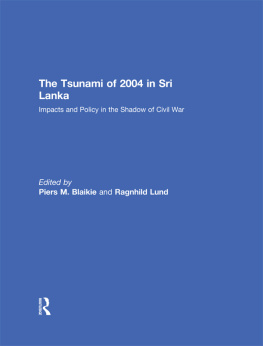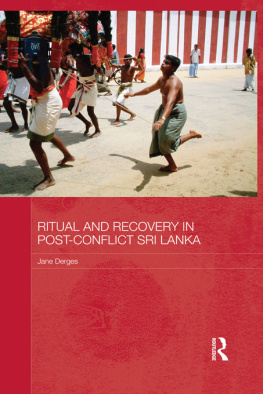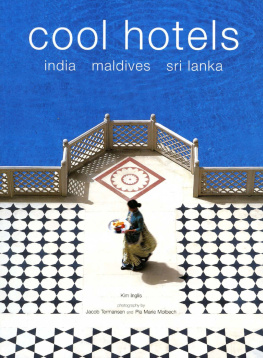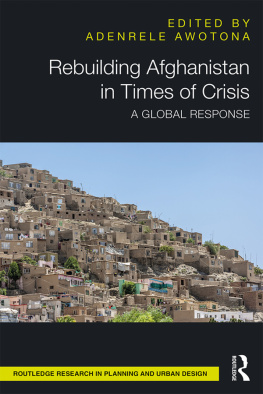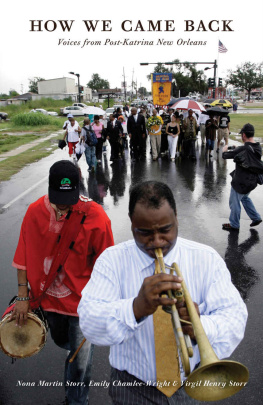First published 2012 in India
by Routledge
912 Tolstoy House, 1517 Tolstoy Marg, Connaught Place, New Delhi 110 001
Simultaneously published in the UK
by Routledge
2 Park Square, Milton Park, Abingdon, Oxfordshire OX14 4RN
First issued in paperback 2015
Routledge is an imprint of the Taylor & Francis Group, an informa business
2012 Martin Mulligan & Yaso Nadarajah
Typeset by
Star Compugraphics Private Limited
All rights reserved. No part of this book may be reproduced or utilised in any form or by any electronic, mechanical or other means, now known or hereafter invented, including photocopying and recording, or in any information storage and retrieval system without permission in writing from the publishers.
British Library Cataloguing-in-Publication Data
A catalogue record of this book is available from the British Library
ISBN13: 978-1-138-66242-1 (pbk)
ISBN13: 978-0-415-50155-2 (hbk)
First and foremost, this book is dedicated to the memory of the more than 200,000 people who lost their lives in the 2004 tsunami. The killer waves came without warning, under an unsuspicious clear blue sky, and many of those who perished would have survived if they had been given enough notice to reach high ground. At the same time, we dedicate this book to all those who lost their children, spouses, parents, close family members, friends, and neighbours. The grief we saw in their eyes and heard in their voices will stay with us forever. Too often, survivors told us about having to make the unbearable choice of having to let go of one child or loved one in order to save another.
We also want to honour the heroism of those who saved other people sometimes risking their own lives and helped the survivors and their communities to get back on their feet again. We acclaim the volunteers who came from all around the world to help in relief and recovery. We hope that the world will learn from the successes and failings of the relief and reconstruction effort. Disaster recovery will never be mistake-free, especially when nature turns on us with unexpected fury and tears apart all that had been taken for granted. However, lessons can be learnt and preventable mistakes can be avoided. Nature has vented its fury many times since the tsunami, and climate scientists are telling us that we can expect more frequent and more severe disasters in the decades ahead.
We have tried our best to capture and communicate what a number of people told us across five tsunami-affected areas in Sri Lanka and southern India. However, it seems appropriate to begin with the words of a Hambantota woman with three young children, who lost her husband and her home in the tsunami, and who probably spoke for many others when she told us:
We lived in tents in a camp, and it was really difficult. We stayed at home, holding our children and crying out of grief. We did not run around speaking to organisations and arranging for aid. Those who did not experience any deaths in their family were able to go out and make arrangements for themselves. I sat with my baby in a corner. I did not value those things. My father told me to come and at least claim a house to live in..
This new village (in Hambantotas new town) has a mix of Muslims and Sinhalese. Since the time I arrived here, people have showered me with love and care. If they cook something special, they offer some to me. If the children come home from school, they feed them and look after them.
It is very hot and dusty here. I have to travel to town to buy vegetables and other food items. The toilets do not work properly. The house does not have a kitchen; you can see that they have separated the space with a piece of wood to cook in. The Tzu Chi Village and CARE houses have kitchens, but we do not. We had to make our own kitchens at the back. But people are trying to keep their spirits up with the thought that the area will develop slowly and become all right. We cannot lose faith in this hope.
AIADMK: All India Anna Dravida Munnetra Kazhagam. One of the two dominant political parties in Tamil Nadu, held power in the state at the time of the tsunami.
BEDROC: Building and Enabling Disaster Resilience of Coastal Communities. A forum for Indian NGOs operating in southern India.
CBMS: Community-Based Poverty Monitoring System. An international network organisation, based in Manila, Philippines.
CBOs: Community-Based Organisations. Operate in local communities and sometimes take the form of a localised NGO.
CCPC: Coastal Community Protection Committee. Formed by tsunami survivors in Chennai to influence plans for resettlement.
DDMAs: District Disaster Management Authorities. District level agencies working under the NDMA and SDMAs in India.
DMK: Dravida Munnetra Kazhagam. Second major political party in Tamil Nadu, replaced the AIADMK as the governing party in 2006.
ECDF: East Coast Development Forum. Formed by NGOs and CBOs working on tsunami relief in southern India.
FoG: Foundation of Goodness. A Sri Lankan NGO, initially established in Seenigama, Sri Lanka.
HDCC: Hambantota District Chamber of Commerce. A body representing business interests in the Hambantota district, Sri Lanka.
INGOs: International Non-Government Organisations.
IOM: International Organisation for Migration. Worlds leading inter-governmental organisation in the field of migration, formed in 1951.
IUCN: International Union for the Conservation of Nature. Largest global environmental network, formed in 1948 under the auspices of the UN.
JHU: Jathika Hela Urumaya. A political party formed by Buddhist monks in 2004 to promote clean politics and to defend the unitary state of Sri Lanka.
JVP: Janatha Vimukhti Peramuna. A political party formed in southern Sri Lanka to fight for the interests of neglected rural Sinhalese communities; it adopted a radical form of Sinhalese nationalism.
LTTE: Liberation Tigers of Tamil Eelam. A party formed by Velupillai Prabhakaran in the early 1970s to fight for an independent Tamil state in the north-east of Sri Lanka.
MWRA: Muslim Womens Research and Action. A welfare and advocacy organisation based in Sainthamaruthu, Sri Lanka.
NDMA: National Disaster Management Authority, India. It coordinates the work of SDMAs and DDMAs.
NESDO: Natural Environmental Social Development Organisation. An NGO working along the coast in the Ampara District, Sri Lanka.
PAM: Peoples Action Movement. An NGO based in Chennai, India.
P-TOMS: Post-Tsunami Operational Management Structure. An agreement regarding the distribution of tsunami aid negotiated between the Sri Lankan government and the LTTE in 2005.
RADA: Reconstruction and Development Agency. It replaced TAFREN in February 2006.
SDMAs: State Disaster Management Authorities. State-based agencies operating under the NDMA in India.
SLFP: Sri Lanka Freedom Party. Formed as a split from the United National Party in 1956 to promote Buddhist values and Sinhala language. Its first leader was Solomon Bandarankaike.


